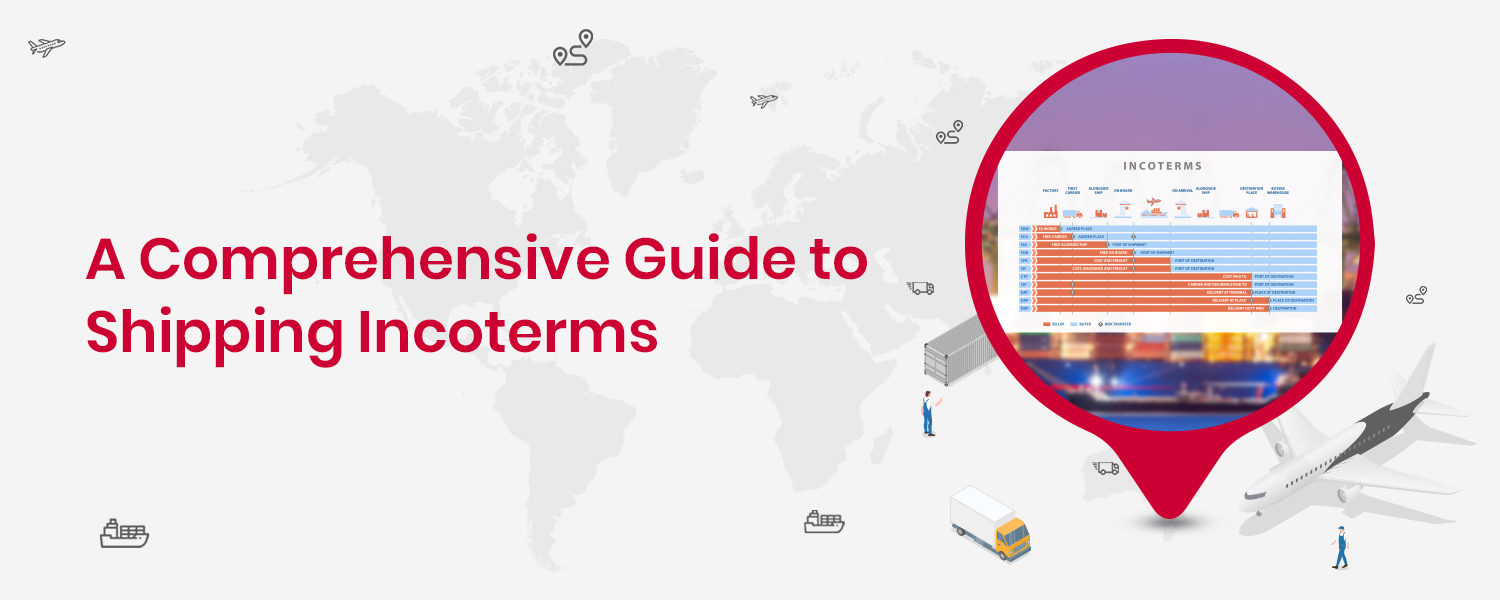In global commerce, where goods traverse oceans and cross borders, there lies a hidden language – Incoterms code that dictates the flow of international shipping. For eCommerce businesses sailing in global trade, decoding these Incoterms is a strategic manoeuvre that can be the difference between success and drift in the competitive marketplace.
Crafted by the International Chamber of Commerce, Incoterms are the universal lexicon that clarifies shipping responsibilities between buyers and sellers. This blog will teach you everything about Shipping Incoterms, unlocking the secrets to efficient, cost-effective, and legally sound global trade.
Understanding Incoterms in International Trade
Incoterms, an abbreviation for International Commercial Terms, represent a cornerstone of international trade, providing a standardised set of rules and definitions for global trade transactions. First conceived in 1936 by the International Chamber of Commerce (ICC), these terms were created to bridge gaps and minimise misunderstandings in international trade.
Over the years, Incoterms have evolved, reflecting changes in the global trading environment. They play a pivotal role in simplifying transactions. They meticulously outline who is responsible for what in the export-import process, covering everything from transportation, insurance, and customs duties to the point of delivery and risk transfer. By standardising these aspects, Incoterms reduce uncertainties and potential disputes caused by differing interpretations of shipping terms in various countries.
Overview of the Two Categories of Incoterms
Incoterms for Any Mode of Transport: This category includes seven terms that apply to all types of transportation, be it air, road, rail, or sea. They are versatile and can be used in various shipping scenarios. These terms are EXW (Ex Works), FCA (Free Carrier), CPT (Carriage Paid To), CIP (Carriage and Insurance Paid To), DAP (Delivered at Place), DPU (Delivered at Place Unloaded), and DDP (Delivered Duty Paid). These terms are particularly significant in today’s diversified shipping practices, offering flexibility and applicability across different transportation methods.
Incoterms Specifically for Sea and Inland Waterway Transport: These four terms are tailored specifically for goods transported by sea and inland waterways. They include FAS (Free Alongside Ship), FOB (Free On Board), CFR (Cost and Freight), and CIF (Cost, Insurance, and Freight). These terms address the unique aspects of maritime shipping, such as loading and unloading goods at ports. They are critical in transactions involving bulk and heavy cargo typically transported by sea.
Breaking Down Common Incoterms
DDP – Delivered Duty Paid
DDP signifies that the seller delivers goods ready for unloading and bears all costs and risks involved in bringing the goods to the destination, including duties, taxes, and other charges. It represents one of the maximum obligations for a seller.
Under DDP, the seller is responsible for transporting goods to the buyer’s country, including all logistics, customs clearances, duties, and taxes. The buyer’s primary responsibility in a DDP agreement is to unload the goods upon arrival and take delivery. This means the seller must be well-versed in the import regulations and procedures of the buyer’s country.
DPU – Delivered at Place Unloaded
DPU, introduced in Incoterms 2020, replaced the term DAT (Delivered at Terminal). Under DPU, the seller delivers goods to a named place and is responsible for unloading. The seller must handle all transportation costs and risks, including unloading at the final destination. The buyer takes over the responsibility once the goods are unloaded at the named place.
DPU is ideal for transactions where the seller can manage unloading at the destination. It is suitable for large-scale or infrastructure projects where the delivery site is not a standard shipping terminal.
DAP – Delivered at Place
DAP requires the seller to deliver the goods to a named place, ready for unloading at the buyer’s disposal. However, the seller is not responsible for unloading. The seller covers all costs and risks involved in delivering goods to the named destination but not unloading. The buyer is responsible for unloading and any further transportation after delivery. DAP is suitable when buyers want control over import formalities or when sellers cannot undertake import clearance due to regulatory challenges.
CPT – Carriage Paid To
CPT (Carriage Paid To) means the seller pays for the freight to transport goods to a named destination. However, the risk transfers to the buyer once the goods are handed over to the first carrier. The seller handles pre-carriage and carriage to the named place but not the risk once the goods are in transit. The buyer assumes risk when the goods are transferred to the first carrier.
CPT is ideal for shipments where the buyer wants control over the goods once they are in transit but prefers the seller to arrange initial transportation. It’s often used when multiple modes of transport are involved.
CIP – Carriage and Insurance Paid
CIP, or Carriage and Insurance Paid To, is an Incoterm where the seller delivers goods to a carrier they choose but also pays for the carriage and insurance to the named destination. It’s a term used across all transport modes. In CIP agreements, the seller must procure insurance against the buyer’s risk of loss or damage to the goods during the transport. The level of insurance coverage is generally negotiable and should be specified in the contract.
CIF – Cost, Insurance, and Freight
Common in sea freight, CIF means the seller delivers goods, clears them for export, and is responsible for carriage and insurance costs to the named destination port. Under CIF, the seller must pay for the costs, freight, and insurance necessary to bring the goods to the destination port. The buyer takes over the risk once the goods are loaded onto the ship. They are responsible for any additional transport costs and import duties.
CFR – Cost and Freight
CFR, or Cost and Freight, is similar to CIF but doesn’t include insurance. It’s used exclusively for sea and inland waterway transport. Unlike CIF, CFR does not require the seller to insure the goods during transport, placing greater risk on the buyer. The seller is responsible for paying the costs and freight to bring the goods to the destination port, but risk passes to the buyer when the goods cross the ship’s rail at the port of shipment.
FOB – Free On Board
A term used in maritime shipping, FOB means the seller loads the goods on board a vessel chosen by the buyer, and the risk passes to the buyer at this point. The seller must clear the goods for export and load them onto the ship. The risk transfers to the buyer once the goods are on board. From the point the goods are loaded onto the vessel, the buyer assumes all costs and risks.
FAS – Free Alongside Ship
This term is specific to sea and inland waterway transport. The seller delivers the goods alongside the ship at the named port of shipment. The seller must clear the goods for export and place them alongside the ship. The buyer takes over all responsibilities, including loading onto the ship and subsequent transport. It’s suitable for bulk or heavy-lift cargo where the buyer prefers to manage the loading process.
FCA – Free Carrier
Flexible across all transport modes, FCA mandates that the seller delivers the goods, cleared for export, to the carrier appointed by the buyer at a named place. The seller’s responsibility is to hand over the goods to the buyer’s carrier. The buyer takes over all responsibilities from this point, including main carriage and insurance. FCA is versatile and ideal for containerised goods where the buyer wants to control the transport and costs.
EXW – Ex Works or Ex-Warehouse
In EXW, the seller makes goods available at their premises, and the buyer is responsible for all subsequent costs and risks. The seller’s role is limited to making the goods available at their premises. They don’t need to load the goods or clear them for export. The buyer assumes all transport costs and risks, including loading at the seller’s premises and all transportation. EXW is often preferred by buyers who have better control over the logistics in the seller’s country or for domestic transactions.
Advantages of Using Incoterms
Clarification of Responsibilities
Incoterms play a pivotal role in international trade by distinctly outlining the roles and responsibilities of buyers and sellers. This clarity is crucial in minimising misunderstandings and confusion, particularly in cross-border transactions where different interpretations of shipping terms can lead to conflicts.
Risk Management
Knowing exactly when the responsibility for the goods shifts is crucial for both parties to manage their risks effectively. By outlining the responsibilities and risks, Incoterms enable parties to make informed decisions, particularly concerning insurance and other risk mitigation strategies. This foresight is essential in planning for and managing potential issues during transportation.
Cost Efficiency and Planning
Incoterms delineate who is responsible for various costs involved in transporting goods. This transparency allows businesses to plan and budget their expenses more effectively, ensuring there are no surprise costs. Choosing terms that best suit their financial strategy gives businesses control over their shipping costs. This aspect particularly benefits smaller businesses or those new to international trade.
Logistics and Operational Efficiency
Incoterms simplify and standardise the shipping process, making international trade more efficient. This standardisation is crucial in reducing errors and delays due to misunderstandings or miscommunications.
Legal and Compliance Benefits
Incoterms are legally recognised globally, providing a legal framework familiar to courts and governments worldwide. This recognition is essential in ensuring that contracts are enforceable and respected across borders. Incoterms help businesses adhere to international trade regulations, ensuring compliance with laws and regulations in different countries.
Facilitation of International Trade
By making international transactions simpler and more secure, Incoterms facilitate global trade, connecting markets and enabling the smooth flow of goods across borders. Incoterms establish a reliable foundation for trade, especially between parties unfamiliar with each other. This trust is crucial in fostering long-term business relationships.
Incoterms for eCommerce Businesses
Incoterms essentially dictate the division of responsibilities, costs, and risks between sellers and buyers in eCommerce transactions. They serve as a universal language, ensuring that all parties involved in an international transaction clearly understand their obligations.
These terms define critical aspects like who pays for shipping, insurance, and customs duties, which are vital components in the overall cost structure of an online sale.
When selecting an Incoterm for eCommerce shipping, businesses must consider various factors, including the type of product, shipping destination, and the level of control they wish to maintain over the shipping process.
The chosen Incoterm should align with the business’s logistical capabilities and financial strategies. For instance, DDP (Delivered Duty Paid) might be preferable for businesses wanting to offer a comprehensive service to their customers, covering all shipping and customs duties.
The selection of Incoterms also needs to reflect the business’s risk tolerance.
The selection of Incoterms in B2B (Business-to-Business) eCommerce often differs from that in B2C (Business-to-Consumer) due to the different nature of transactions. B2B transactions typically involve larger quantities and values, necessitating more comprehensive terms like CIF (Cost, Insurance, and Freight) or CIP (Carriage and Insurance Paid To). In B2C eCommerce, where individual consumers are often the end recipients, terms like DDP or DAP (Delivered at Place) might be more prevalent. These terms ensure that the consumers are not burdened with additional responsibilities like customs clearance or additional shipping charges.
Conclusion
The use of Incoterms in this eCommerce cannot be overstated, they are the language of global commerce, providing clarity and consistency in transactions that span borders and cultures. eCommerce entities, whether seasoned traders or new entrants are encouraged to embed Incoterms into their international shipping strategies. By doing so, they can achieve more efficient, compliant, and cost-effective shipping solutions.
The right choice of Incoterm can significantly influence the success of a transaction. Likewise, the right choice of international courier services can significantly influence your export-import business – from ensuring timely deliveries to reducing shipping costs and satisfying legal requirements. Find the best international shipping company in India with the help of NimbusPost. Get expert international courier recommendations, faster customs clearance, and seamless freight forwarding right from a single platform.




